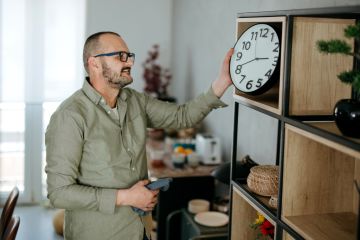Living on a bus: One professional couple's solution to the housing crisis

When the landlord hiked their rent in May this year, Catherine Coomans, 28, and Tom Low, 31, took a creative approach to the housing affordability issue and decided to live life on the road.
At the time, the couple were forking out $500 a week on a two bedroom apartment in Ashfield (an inner-west suburb of Sydney), and about to launch their online business Kargow, specialising in handmade products.
“We went for this huge bush walk and were [thinking] ‘what are we going to do?’ ” Coomans says. “We really didn’t think it was feasible when we were about to put a lot of money into the business. We made a spur of the moment decision and gave our notice to the landlord the next day.”
The enterprising pair sold most of their possessions on Gumtree and purchased an old 1997 Toyota Coaster, formerly an ex-school bus used in Penrith that had been converted into a motorhome. With the help of family and friends they spent three months renovating it into a cosy home they could live and work in. “We ripped out all the interior and started putting in all of our own interiors,” Coomans says.
The bus has everything they need including a double bed at the back, a kitchen and bathroom with hot water, shower and toilet, and a lounge/dining area at the front they convert into an office during the day. Cushions and curtains (hand-sewn by Coomans), and fairy lights add a home-like touch.
The pair watch Netflix using a pocket projector. “There’s nothing that we’ve really missed from living in a bigger space,” Coomans says.
Two solar panels on the roof power the lights, computers, microwave, fridge and more. “We have two gas bottles that run the stove and the hot water,” Coomans says. The bus also carries about 100 to 150 litres of water, stored in two tanks beneath.
The pair stay mostly in places designated as free camping zones, including parks, state forests, and RV-friendly towns. “It’s a real mixture,” Coomans says. “Some are amazing – by yourself by the ocean. Others are in town and it’s quite busy. In Australia you can stay in any rest stop for 24 hours if you’re in a jam.”
- Related: How Ashlee is flipping Hawaiian apartments
- Related: The downside of rural life no one talks about
- Related: Aussies on the reality of living in ‘paradise’
Currently near the border of Queensland’s Gold Coast and NSW, the duo have been slowly making their way up the north coastline. “We decided early on, no plan was the best plan. We take it week by week and look on the map and see somewhere that looks good and head upwards. We hope that next year we’ll travel for the whole year and do the full wrap of Australia.”
The response from family and friends has been overwhelmingly positive, with their Instagram account, adventuresinabus, already followed by more than 4000 people.
The biggest positive has been an instant drop in stress levels, Coomans says. “You’re out in a different spot every week working. It’s just been instantly relaxing and we’re more productive.”
And, while not being attached to an address might seem isolating, it’s been the opposite for the country-raised couple (both Coomans and Low are originally from central NSW). “There’s no sense of community living there [Ashfield], which I missed,” Coomans says. “There’s such a beautiful community travelling.”
A more mobile living situation has also enabled them to catch up on friends and family they haven’t seen for a while. “We’re sort of able to duck in and see people along the way.”
A big advantage of living completely off the grid has been the lack of rent and utilities. “We’re enjoying the fact we’re saving because we’re not paying rent. That money is instantly now going into our pockets. We do our grocery shopping once a week, whereas we used to do it every few days,” Coomans says. “You can’t move as easily in a bus. So we’re saving money just by little things like that as well.”
Their biggest expense is petrol – averaging about $50 to $100 a week.
But are there any negatives to this way of life?
“You have to think carefully about your water and food,” Coomans say. “We’ve almost been caught out a little bit.”
Surprisingly, spending so much time together hasn’t been an issue. “Even if someone’s on the bed and someone’s in the front, you feel like you’re in two different spaces.
“It has been the best decision we have ever made,” she says. “A lot of people say: ‘I would love to do that, it’s a dream’. My biggest tip to them is, just do it. You only live once.”
Tips to a mobile life:
- Get the Wikicamps App – for info on where you can camp around Australia, and all else you need to know
- Ensure you have a good power setup
- A mobile broadband plan, rooftop antenna and 4G booster provide good internet reception required for working on the road
- Research the kind of vehicle you buy. Even between year models, buses can vary in size.
We recommend
States
Capital Cities
Capital Cities - Rentals
Popular Areas
Allhomes
More







